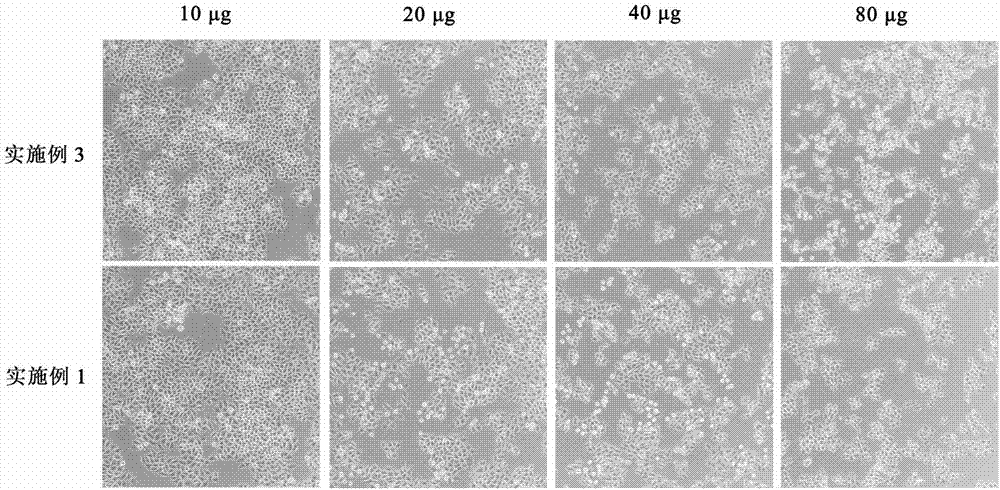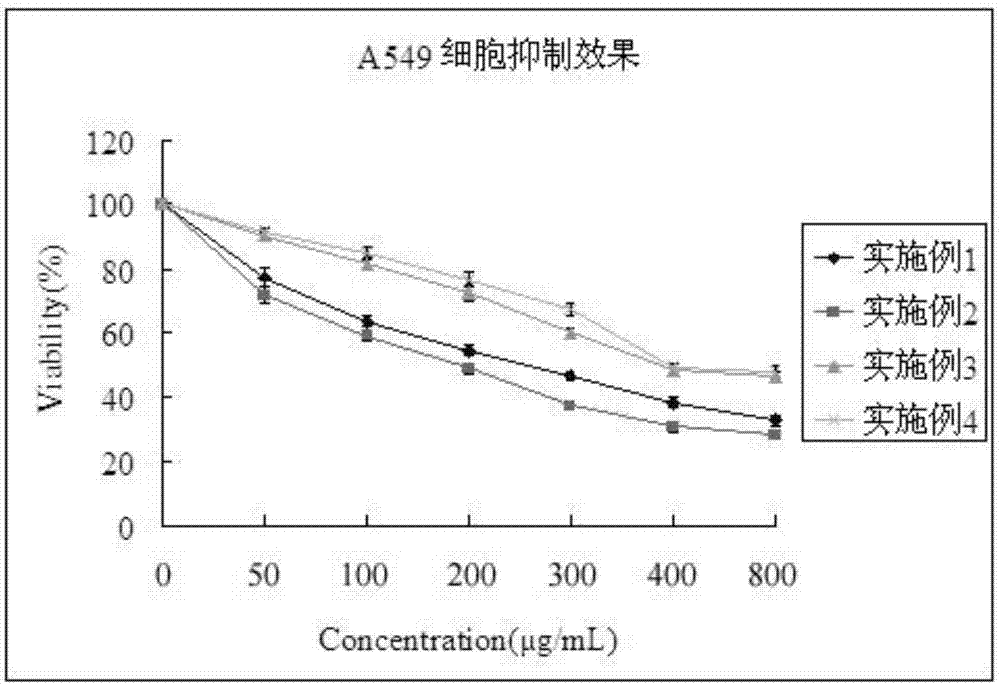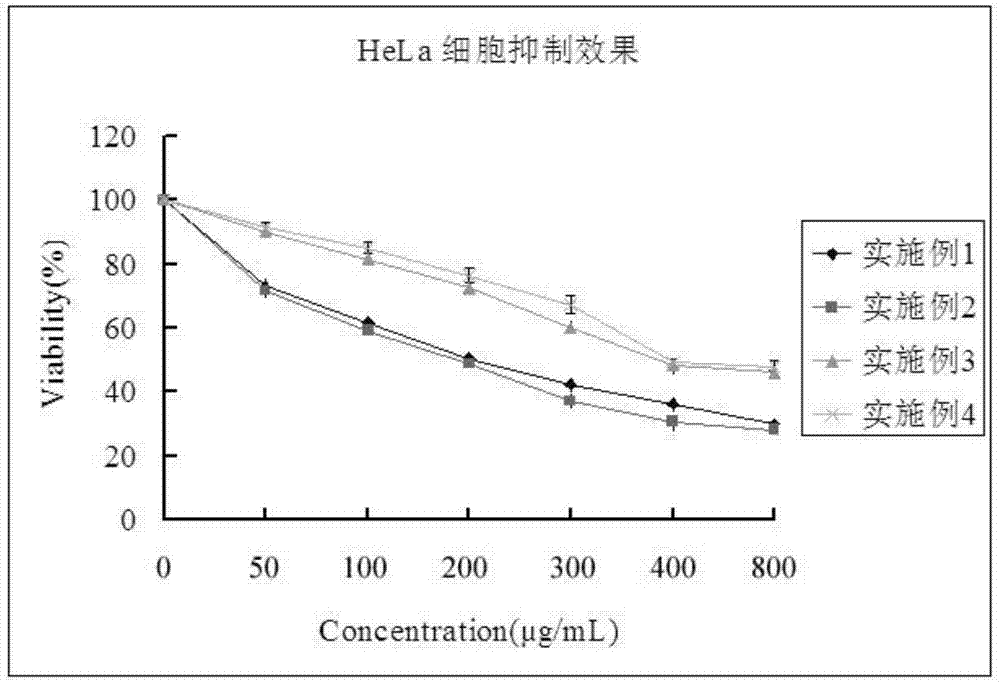Morchella vulgaris, rhizoma polygonati and snowdrop active proteoglycan protein, as well as preparation method and application thereof
A technology of active polysaccharides and morels, applied in the preparation method of peptides, chemical instruments and methods, peptide/protein components, etc., can solve problems such as the lack of a unified understanding, and achieve the effect of improving activity
- Summary
- Abstract
- Description
- Claims
- Application Information
AI Technical Summary
Problems solved by technology
Method used
Image
Examples
Embodiment 1
[0035] Take 10 g of Morchella, Rhizoma Rhizoma Polygonatum, and snow lotus dry materials and mix a total of 30 g, pulverize to 300 mesh with a superfine pulverizer, then add 0.1M sodium chloride solution with a mass-volume ratio of 15 times the volume, stir evenly, and extract 6 hours, filtered through two layers of gauze, and centrifuged (4°C, 5,000g, 30min) to obtain the supernatant and precipitate.
[0036] Take the above precipitate, add 0.5M sodium chloride solution with a mass volume ratio of 5 times the volume, stir evenly, extract for 2 hours, filter through two layers of gauze, and centrifuge (4°C, 5,000g, 30min) to obtain the supernatant and precipitate.
[0037] All the obtained supernatants were combined to obtain an extract.
[0038] Add sulfuric acid to the extract to reach 40% saturation, let it stand for 5 hours, and centrifuge (4°C, 10,000g, 20min) to remove the precipitate;
[0039] Take the supernatant, use ultrafiltration to concentrate and desalt, the mol...
Embodiment 2
[0042] Get 20g of hickory chick, sealwort dry material and mix altogether 40g, pulverize to 300 mesh with superfine pulverizer, then add the 0.3M sodium chloride solution of mass volume ratio 10 times of volume, stir well, leaching 6 hours, 2 Filter through a layer of gauze and centrifuge (4°C, 5,000g, 30min) to obtain the supernatant and precipitate.
[0043] Take the above precipitate, add 0.3M sodium chloride solution with a mass volume ratio of 8 times the volume, stir evenly, extract for 4 hours, filter through two layers of gauze, and centrifuge (4°C, 5,000g, 30min) to obtain the supernatant and precipitate.
[0044] All the obtained supernatants were combined to obtain an extract.
[0045] Add sulfuric acid to the extract to reach 40% saturation, leave it for 6 hours, and centrifuge (4°C, 10,000g, 20min) to remove the precipitate;
[0046] Take the supernatant, use ultrafiltration to concentrate and desalt, the molecular weight cut-off of the ultrafiltration membrane i...
Embodiment 3
[0049]Get 50g of hickory chick dry material, pulverize to 300 order with superfine pulverizer, then add the 0.2M sodium chloride solution of mass volume ratio 20 times of volume, stir, leaching 4 hours, 3 layers of gauze filter, centrifugal ( 4°C, 5,000g, 30min), to obtain supernatant and precipitate.
[0050] Take the above precipitate, add 0.2M sodium chloride solution with a mass volume ratio of 10 times the volume, stir evenly, extract for 3 hours, filter with 3 layers of gauze, and centrifuge (4°C, 5,000g, 30min) to obtain the supernatant and precipitate.
[0051] All the obtained supernatants were combined to obtain an extract.
[0052] Add sulfuric acid to the extract to reach 40% saturation, let it stand for 4 hours, and centrifuge (4°C, 10,000g, 20min) to remove the precipitate;
[0053] Take the supernatant, use ultrafiltration to concentrate and desalt, the molecular weight cut-off of the ultrafiltration membrane is 5000 Dalton; the volume is concentrated to 30% of...
PUM
 Login to View More
Login to View More Abstract
Description
Claims
Application Information
 Login to View More
Login to View More - R&D
- Intellectual Property
- Life Sciences
- Materials
- Tech Scout
- Unparalleled Data Quality
- Higher Quality Content
- 60% Fewer Hallucinations
Browse by: Latest US Patents, China's latest patents, Technical Efficacy Thesaurus, Application Domain, Technology Topic, Popular Technical Reports.
© 2025 PatSnap. All rights reserved.Legal|Privacy policy|Modern Slavery Act Transparency Statement|Sitemap|About US| Contact US: help@patsnap.com



